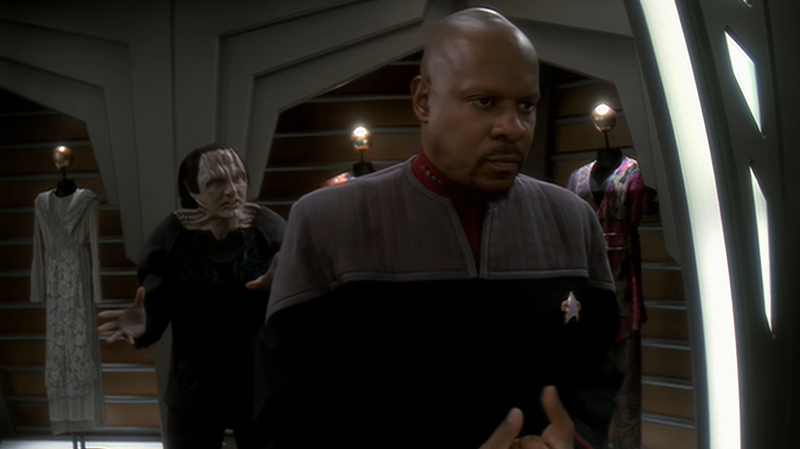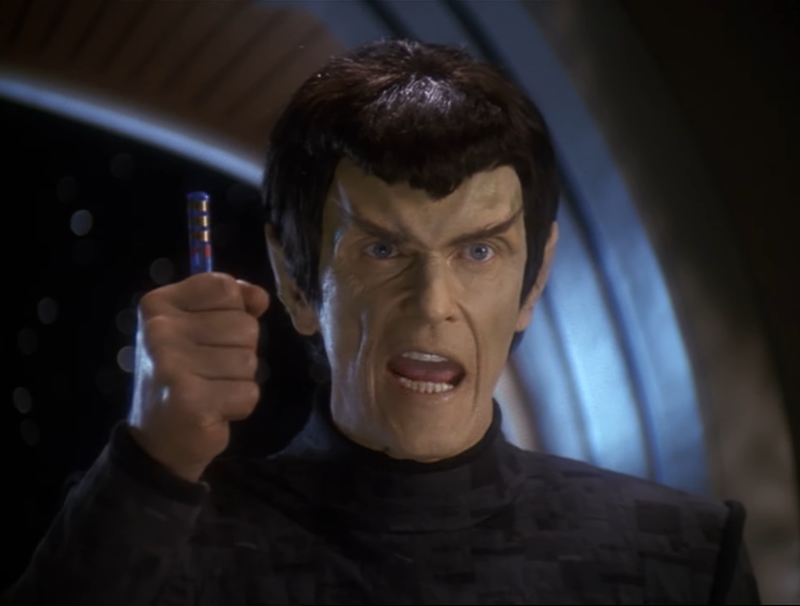The Best Moment in Deep Space Nine's Greatest Episode Is a Punch Left Unthrown

- Oops!Something went wrong.Please try again later.
Twenty-six years ago today, Deep Space Nine delivered the knife under its cloaked examination of Star Trek’s morals in wartime with all the delicate precision of a sewing needle: the incredible “In the Pale Moonlight,” not just one of DS9 or Star Trek’s finest hours, but one of the all time greatest episodes of TV ever made. But the finest moment in an already immaculate piece of television is all about the ways to enact violence without lifting a single finger.
“In the Pale Moonlight,” framed around a maudlin Captain Sisko recounting recent events in his personal log after a long, long day, is about the increasing moral compromises he is willing to make as one of Starfleet’s vanguards in the increasingly dire war against the Dominion. Seeing an opportunity to bring one of the Federation’s coldest enemies, the secretive Romulans, into a war they’ve stayed neutral in, Sisko finds himself drawn into the charismatic orbit of the simple tailor and occasionally master of all sorts of spycraft, Garak the Cardassian clothier, as the two plot to artificially construct evidence of a Dominion plot to invade the Romulan Star Empire, and pass it along to a Romulan senator.

The episode layers on its tension through each circle of hell Sisko is willing to put his soul through. Even the first step of simply working with Garak on such a plan is already heinous enough for the high and mighty values of Starfleet’s officer class, but bit by bit, Sisko begins to see the proverbial river of blood he must wade into to come out of the other side with even a chance of Romulus entering the Dominion War. Using criminals to fake evidence, crafting the perfect deception, planting it in Senator Vreenak’s hands, all this would be tantamount to the gravest of moral costs our hero could pay... and then it all blows up in his face when Vreenak calls Sisko out on his bluff, realizing the data rod he’s been handed showcasing the Dominion’s supposed plans is counterfeit.
It’d be here that any other Star Trek show would plant its flag as the lowest moment one of its heroes could sink to: they played dirty, and now must face the consequences of taking the low road. But Deep Space Nine is not any other Star Trek show, and so it prepares to thrust its knife. The next day, as senior staff monitor casualty lists and Sisko braces for his fall, a Starfleet Intelligence report comes through confirming the death of a Romulan Senator in a shuttlecraft explosion the Star Empire is laying at the hands of Dominion subterfuge. It’s Vreenak: he’s dead, the secret of Sisko’s moral cost with him, and Sisko knows exactly who’s to blame for the explosion.
As Sisko storms down to Garak’s shop, we get it: the finest moment in all of Deep Space Nine. Time and time again in the show, in ways small and large, we’ve seen up to this point that Benjamin Sisko is not a man who pulls punches, metaphorically or otherwise. From laying out Q the moment he tries to cast the then-Commander as another Picard, to his dogged determination to root out the anti-Cardassian guerrillas of the Maquis, Sisko has always acted as he does here: to come in swinging. He decks Garak, sending him clean across the room. He yells his accusations at Garak—he killed Vreenak, he killed the criminal they used to forge that data rod; all along, he’s knowingly brought the Romulans into the deadliest war the Alpha Quadrant has seen in generations on a falsehood. Even without the punch, this isn’t Sisko passionate or dogged or determined. He is furious, something we have seen simmering in him before, but now fully unleashed.
But Garak never fights back. He takes Sisko’s punch, and all the rage, goes to block the second swing, but he doesn’t match Sisko’s braggadocio. He waits. And then in cold, calculating form, he turns Sisko on himself—laying out all the evidence that the Romulans will now have, from a dead senator to an imperfect, damaged rod containing even the faintest traces of evidence of a Dominion plot, and guides Sisko along the way to a conclusion that was there from the beginning of the episode. Sisko would see what Garak predicts the Romulans will see, and would enter the war against the Dominion, just as they will. Garak doesn’t even have to say it, he just lets Sisko work through it out loud himself, not even having to push him... because for all his posture, for all the fists swinging, they think exactly the same. And if anything, Sisko is even dirtier than that, because he already knew that in going to Garak he would get someone who willing to dirty their own hands on his behalf, and leave him with the victory he wanted—at any cost, no matter what he’d claim otherwise.
And so, with Sisko at the lowest depths of hell at last, he and Garak are locked as kindred spirits in this game of spycraft and moral theater. It’s a remarkable moment, one that has rightly stuck with Star Trek for the two and a half decades since it first broadcast, because of the way it skewers the franchise’s legacy of purported enlightenment in such an elegantly compelling way. For years before this, Starfleet and its officers have been depicted as above this kind of underhanded manipulation—that our heroes talk their ways out of fights, that they maintain the moral high ground, and that even when they falter, when they play a little dirty, it’s with a roguish charm, and in the manner of a hero, the small, innocent prices paid, for a greater good that is always worth it. It’s never meant to stain their soul, because in the end, it always works out in the hero’s favor—and their righteous view of the universe.
Sisko’s greater good is hundreds of thousands, if not millions, of beings slaughtered to prevent the complete destruction of the Alpha Quadrant powers as we know them, predicated on a lie. In the end, he got it, not in the noblest of manners as the heroes before him might have, but through cloak and dagger deception and knives in the dark. Because, back against the wall, he was always willing to throw that punch—and because Garak knew it too, he himself never had to.
Want more io9 news? Check out when to expect the latest Marvel, Star Wars, and Star Trek releases, what’s next for the DC Universe on film and TV, and everything you need to know about the future of Doctor Who.

